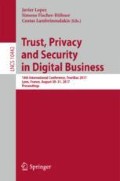Abstract
In our digital society managing identities and according access credentials is as painful as needed. This is mainly due to the demand for a unique password for each service a user makes use of. Various approaches have been proposed for solving this issue amongst which Identity Provider (IDP) based systems gained most traction for Web services. An obvious disadvantage of these IDPs is, however, the level of trust a user requires to place into them. After all, an IDP stores a lot of sensitive information about its users and is able to impersonate each of them.
In the present paper we therefore propose an architecture that enables to operate a personal IDP (PIDP) on a mobile device owned by the user. To evaluate the properties of our introduced mobile PIDP (MoPIDP) we analyzed it by means of a prototype. Our MoPIDP architecture provides clear advantages in comparison to classical IDP approaches in terms of required trust and common threats like phishing and additionally regarding the usability for the end user.
Notes
- 1.
Until here the protocol is identical to OAuth 2.0.
References
Abe, T., Itoh, H., Takahashi, K.: Implementing identity provider on mobile phone. In: Proceedings of the 2007 ACM Workshop on Digital Identity Management, DIM 2007, pp. 46–52. ACM, New York (2007). http://doi.acm.org/10.1145/1314403.1314412
Alliance, F.: FIDO UAF Architectural Overview (2016). https://fidoalliance.org/specs/fido-uaf-v1.1-rd-20161005/fido-uaf-overview-v1.1-rd-20161005.html
Barnes, R., Mozilla: Use Cases and Requirements for JSON Object Signing and Encryption (JOSE) (2014). https://tools.ietf.org/html/rfc7165
Bennett, A.: Jose library for ruby. https://github.com/potatosalad/ruby-jose
Bradley, J., Sakimura, N., Jones, M.: JSON Web Token (JWT) (2015). https://tools.ietf.org/html/rfc7519
Cisco Systems: cjose - jose library for c/c++. https://github.com/cisco/cjose
Connect2id: JOSE + JWT library for Java. https://connect2id.com/products/nimbus-jose-jwt
Dhamija, R., Dusseault, L.: The seven flaws of identity management: usability and security challenges. IEEE Secur. Priv. 6(2), 24–29 (2008)
Dierks, T.: The Transport Layer Security (TLS) Protocol Version 1.2 (2008). https://tools.ietf.org/html/rfc5246
Facebook: Access Tokens - Facebook Login - Documentation (2017). https://developers.facebook.com/docs/facebook-login/access-tokens/
Ferdous, M.S., Poet, R.: Portable personal identity provider in mobile phones. In: 2013 12th IEEE International Conference on Trust, Security and Privacy in Computing and Communications (TrustCom), pp. 736–745. IEEE (2013). http://ieeexplore.ieee.org/abstract/document/6680909/
Foundation, O.: OpenID Authentication 2.0 (2007). http://openid.net/specs/openid-authentication-2_0.html
Google: Google Authenticator (2016). https://github.com/google/google-authenticator
Google: Using OAuth 2.0 to Access Google APIs \(|\) Google Identity Platform (2016). https://developers.google.com/identity/protocols/OAuth2
Haller, N.: The S/KEY One-Time Password System (1995). https://tools.ietf.org/html/rfc1760
Hardt, D.: The OAuth 2.0 authorization framework (2012). https://tools.ietf.org/html/rfc6749.txt
Jain, A.K., Ross, A., Prabhakar, S.: An introduction to biometric recognition. IEEE Trans. Circuits Syst. Video Technol. 14(1), 4–20 (2004)
Jones, R., Microsoft: JSON Web Key (JWK) (2015). https://tools.ietf.org/html/rfc7517
Lockhart, H., Campbell, B.: Security assertion markup language (SAML) V2.0 technical overview. OASIS Comm. Draft 2, 94–106 (2008). https://www.oasis-open.org/committees/download.php/14360/sstc-saml-tech-overview-2.0-draft-08-diff.pdf
Lopez, G., Canovas, O., Gomez-Skarmeta, A.F., Girao, J.: A SWIFT take on identity management. Computer 42(5), 58–65 (2009)
Morgan, R.L., Cantor, S., Carmody, S., Hoehn, W., Klingenstein, K.: Federated security: the shibboleth approach. Educ. Q. 27(4), 12–17 (2004). http://eric.ed.gov/?id=EJ854029
Rydell, J., M’Raihi, D., Pei, M., Machani, S.: TOTP: Time-based One-time Password Algorithm (2011). https://tools.ietf.org/html/rfc6238
Sakimura, N., Bradley, J., Jones, M., de Medeiros, B., Mortimore, C.: Openid connect core 1.0. The OpenID Foundation p. S3 (2014). http://openid.net/specs/openid-connect-core-1_0-final.html
Sun, S.T., Beznosov, K.: The devil is in the (implementation) details: an empirical analysis of OAuth SSO systems. In: Proceedings of the 2012 ACM Conference on Computer and Communications Security, pp. 378–390. ACM (2012). http://dl.acm.org/citation.cfm?id=2382238
Thomas, I., Meinel, C.: An identity provider to manage reliable digital identities for SOA and the web. In: Proceedings of the 9th Symposium on Identity and Trust on the Internet, IDTRUST 2010, pp. 26–36. ACM, New York (2010). http://doi.acm.org/10.1145/1750389.1750393
Twitter: OAuth Twitter Developers (2017). https://dev.twitter.com/oauth
Author information
Authors and Affiliations
Corresponding author
Editor information
Editors and Affiliations
Rights and permissions
Copyright information
© 2017 Springer International Publishing AG
About this paper
Cite this paper
Iacono, L.L., Gruschka, N., Nehren, P. (2017). Mobile Personal Identity Provider Based on OpenID Connect. In: Lopez, J., Fischer-Hübner, S., Lambrinoudakis, C. (eds) Trust, Privacy and Security in Digital Business. TrustBus 2017. Lecture Notes in Computer Science(), vol 10442. Springer, Cham. https://doi.org/10.1007/978-3-319-64483-7_2
Download citation
DOI: https://doi.org/10.1007/978-3-319-64483-7_2
Published:
Publisher Name: Springer, Cham
Print ISBN: 978-3-319-64482-0
Online ISBN: 978-3-319-64483-7
eBook Packages: Computer ScienceComputer Science (R0)

